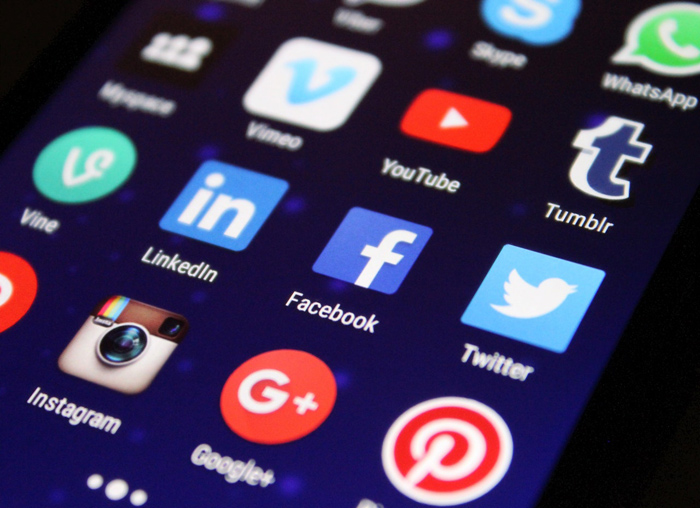社交媒体让人情绪低落?科学家告诉你如何变开心 How to make your social media happier, according to scientists
中国日报网 2021-10-26 16:08

研究反复证实,社交媒体上的负面新闻看多了对人的精神健康有害无益。尽管如此,疫情期间想要“戒掉”社交媒体实在太难。怎样才能让自己开心地使用社交媒体?来看看科学家的解答。

Picture this: you're between Zoom meetings, and scrolling through your social media newsfeed. Headlines like "Death toll continues to rise", "COVID-19 may cause long-term health implications" and "Health-care systems overwhelmed" flash across your screen. Your mood takes a dive, but you can't stop scrolling.
想象一下这个画面:你刚开完一个视频会议,趁着空闲翻阅一下社交媒体推送的新闻。你的屏幕上闪过的标题都是“死亡率继续上升”、“新冠病毒可能会对健康产生长期危害”、“医疗系统不堪重负”之类的。你的心情骤然间变得低落,但是你仍忍不住翻阅的欲望。
If this scenario rings true for you, you're not alone. Research shows people have a tendency to seek out information during uncertain times – it's a natural coping mechanism. But is persistent information-seeking on social media, sometimes called doomscrolling, helpful during a pandemic, or any time?
如果这个场景曾发生在你身上,那么你不是孤身一人。研究发现,人们在充满不确定性的时期往往都会去寻找信息,这是本能的应对机制。但是在社交媒体上持续地搜寻信息(有时被称为末日刷刷刷)在疫情期间或其他时候真的有所助益吗?
Research on the effects of bad news on mood suggest exposure to negative COVID news is likely to be detrimental to our emotional wellbeing.
此前曾研究过负面新闻对心情的影响,结果表明,负面的疫情新闻不利于精神健康。
For instance, one study conducted in March 2020 involving more than 6,000 Americans found that the more time participants spent consuming COVID news in a day, the unhappier they felt.
举例而言,2020年3月开展的一项涵盖了6000多名美国人的研究发现,参与者在一天内用于浏览疫情新闻的时间越多,他们就越不开心。
These findings are striking but leave a few key questions unanswered. Does doomscrolling make people unhappy, or are unhappy people just more likely to doomscroll? How much time spent doomscrolling is a problem? And what would happen if, instead of doomscrolling, we were "kindness scrolling" – reading about humanity's positive responses to a global crisis?
这些研究结果令人震惊,但还是留下了几个悬而未决的关键问题。是末日刷刷刷让人不开心,还是不开心的人更爱末日刷刷刷?在末日刷刷刷上花多少时间会影响情绪?如果我们只看正面新闻(人们对全球危机的积极反应),不看负面新闻,会产生什么结果呢?
To find out, researchers conducted a study where they showed hundreds of people real-world content on either Twitter or YouTube for two to four minutes. The Twitter feeds and YouTube videos featured either general news about COVID, or news about kindness during COVID. Researchers then measured these participants' moods using a questionnaire, and compared their moods with participants who did not engage with any content at all.
为此研究人员开展了一项研究,让数百人花2到4分钟观看推特或油管上的真实内容。推特消息和油管视频中展示的是普通的新冠新闻或疫情期间的善举。然后研究人员用问卷测量了参与者的情绪,并将他们的情绪与没有看任何内容的参与者相比。
People who were shown general COVID-related news experienced lower moods than people who were shown nothing at all. Meanwhile, people who were shown COVID news stories involving acts of kindness didn't experience the same decline in mood, but also didn't gain the boost in mood they'd predicted.
和什么也没看的人相比,观看新冠相关普通新闻的人情绪更低落。与此同时,观看疫情期间善举新闻的人情绪没有变低落,但是也没有像预期的那样变开心。
These findings suggest that spending as little as two to four minutes consuming negative news about COVID-19 can have a detrimental impact on our mood.
这些研究结果显示,观看新冠相关负面新闻仅2到4分钟就会对我们的情绪产生有害影响。
Although researchers didn't see an improvement in mood among participants who were shown positive news stories involving acts of kindness, this may be because the stories were still related to COVID. In other research, positive news stories have been associated with improvements in mood.
尽管在这项研究中,观看正面善举新闻的参与者心情没有改善,但这可能是因为这些故事依然和新冠疫情有关。不过其他研究指出,正面的新闻故事可以改善情绪。
So what can we do to look after ourselves, and make our time on social media more pleasurable?
那么我们要怎么做才能呵护自己的情绪,并让我们的社交媒体时光更加快乐呢?
One option is to delete our social media accounts altogether. Figures show almost half of Facebook users in the UK and the US considered leaving the platform in 2020.
一种选择就是完全删除社交媒体账户。数据显示,2020年英国和美国近半数脸书用户曾考虑退出这一平台。
But how realistic is it to distance ourselves from platforms that connect nearly half of the world's population, particularly when these platforms offer social interactions at a time when face-to-face interactions can be risky, or impossible?
然而,远离这些与世界近一半人口相连的平台是不现实的,尤其是现在这个特殊时期,面对面互动有风险甚至不可能,而这些平台却能够提供社交互动。
Given that avoidance might not be practical, here are some other ways to make your experience on social media more positive.
考虑到避免社交媒体可能不现实,以下有其他几种方式可以让你的社交媒体经历变得更积极。
Be mindful of what you consume on social media. Focus on the personal news and photos shared instead of the latest headlines.
第一,留心你在社交媒体上观看的内容。多看朋友圈上分享的个人消息和照片,少看新闻头条。
Seek out content that makes you happy to balance out your newsfeed. This may be images of cute kittens, beautiful landscapes, drool-worthy food videos or something else. You could even follow a social media account dedicated to sharing only happy and positive news.
第二,查阅推送信息时多看那些让你开心的内容,比如可爱的小猫、美丽的风景、令人垂涎欲滴的美食视频。你甚至可以关注一个专门分享快乐积极新闻的社交媒体账户。
Use social media to promote positivity and kindness. Sharing good things that are happening in your life can improve your mood, and your positive mood can spread to others. You may also like to compliment others on social media. While this might sound awkward, people will appreciate it more than you think.
第三,用社交媒体分享积极善意的内容。分享自己生活中的好事可以改善你的情绪,而你的积极情绪可以感染他人。你也可以在社交媒体上赞美他人,尽管这听起来有点别扭,但是人们比你想象的更喜欢赞美。
As the pandemic continues to alter our lives and newsfeeds, the study highlight the importance of being aware of the emotional toll negative news takes on us. But there are steps we can take to mitigate this toll and make our social media a happier place.
疫情继续改变着我们的生活,也改变了社交媒体推送的内容。这项研究凸显了意识到负面新闻有害心理健康的重要性。但是我们可以采取措施来减轻这一危害,让社交媒体变成更快乐的地方。
英文来源:The Conversation
翻译&编辑:丹妮

















 英语点津微信
英语点津微信 双语小程序
双语小程序